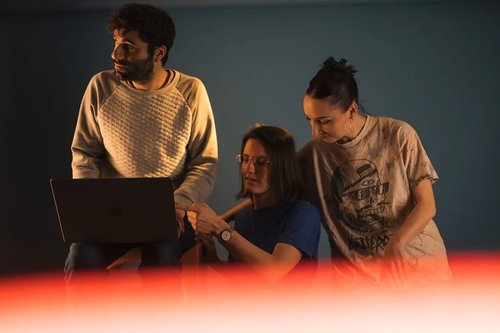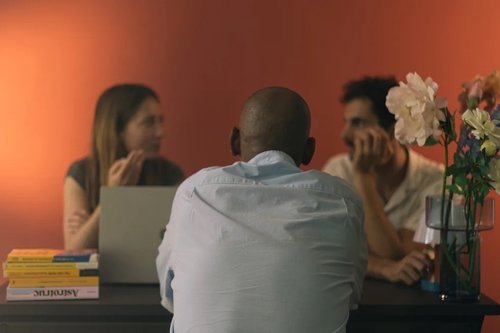Unemployed: How to avoid stereotypes during a job interview
Jan 04, 2024
7 mins


Freelance writer and translator, ex-recruiter
Being unemployed can carry a lot of stigma, and the reasons for your unemployment don’t matter. You may have taken a break to care for children or a family member, you may have been laid off, let go, or simply decided to leave a job that made you unhappy. Long periods of unemployment can dent self-confidence and make it hard to perform well in interviews, yet over 5,000 major companies announced layoffs in 2023, leaving a sizeable portion of Americans unemployed.
Author of Agile Unemployment, employment expert, and podcast host Sabina Sulat is seeking to normalize periods of unemployment: “There’s so much negativity around it and it’s not a pleasant thing, but it’s normal and we don’t look at it this way.” She shares her tips for taking control, boosting your self-esteem, and not letting your unemployed status become an issue in an interview.
What are the stereotypes associated with unemployment?
The biggest problem you’re likely to have with unemployment in an interview is handling an interviewer who stigmatizes unemployment or has a blatant or unconscious bias. Studies as recent as 2021 show this to be true, but things are changing. Sulat believes that the pandemic and countless layoffs are changing people’s attitudes, as well as younger generations, who are more likely to leave a job without having something else lined up, combatting the view that unemployed people are lazy or unambitious.
Often people feel awkward about being unemployed, they feel like they have to explain their situation in detail, but Sulat says to give yourself a break. “I think there’s this unspoken thing that people feel like, even if it’s not true, you did something wrong that you were asked to leave your prior workplace. I know I felt that way and it was just an organizational change, but I still sat there for a long time afterward wondering what I should have done differently.” If you already feel awkward about it yourself, trying to convince someone else that you aren’t to blame can be tricky.
You may also be met with prejudice about what you’ve been doing with yourself since you’ve been unemployed as if your value is inherently attached to your job (spoiler alert: it’s not!). So how can you combat prejudice and best prepare for an interview when you’re unemployed?
10 interview preparation tips for unemployed candidates
1. Take time for self-care
Before you start applying for jobs and attending interviews, Sulat recommends you take time to deal with what happened. “I’m a big advocate for self-care, especially while you’re out of work. I find that it helps people either heal from the trauma of losing work or it just helps them shore up their confidence and resilience.” How you choose to heal is up to you but going into a job interview looking desperate—even if you are!—will only impact interviewers negatively.
2. Make the most of your network
The power of networking is no secret and just because you leave a job or an industry doesn’t mean you should lose contact with all your former colleagues and peers. They can be a useful resource in so many ways. Sulat explains, “Your network is incredibly important, not just for helping you find an available job or to help you maybe get to the front of the line in an organization if they’re already there and can recommend you, but also to tell you what’s relevant in the organization, the industry, what skills are valued.” Having connections and using them for things like informational interviews can help you know exactly what to talk about if you do land a job interview, and how to highlight skills and knowledge that only you can offer.
3. Make a list of accomplishments
Unemployed people often lack self-esteem. It can be hard to remember how good you were at a job when you’ve been out of work for a while. But, says Sulat, “You don’t stop being a great communicator just because that’s not part of your job anymore.” To help you feel confident going into an interview, Sulat recommends you make a list of accomplishments. Think about accolades you were awarded or prizes, consider positive feedback, take a look at past performance reviews, and make a list of all the incredible things you’ve done and positive comments you received. Read it before you go into an interview to give yourself a self-confidence boost so you can project that success to the interviewer. Sulat says, “It’s like your rainy day box that you open up when you’re feeling a little down and it cheers you up.”
4. Practice
Whether you’re unemployed or not, getting some interview practice is always a good idea. You can research tough interview questions and work out how to handle them, record yourself on your phone or computer as you work through some interview questions, or better still, ask a trusted friend to practice with you. Sulat recommends looking at repetitions, whether you say ‘um’ or ‘ah’, and whether you’re showcasing your skills with your responses. “Just knowing and feeling prepared gives you this amazing confidence because it’s one less thing you have to worry about.”
5. Own your story
No matter your unemployment story, rather than hide and worry that they might ask you awkward questions, it’s usually best to own your truth and get it out there on your terms. Sulat shares a client’s story: “I have a client who was dismissed for poor performance when he went into an interview he brought it up because he didn’t want anyone to find out and feel like he had been less than honest … he said, ‘It was a sales job, I am not a salesperson. This isn’t a sales role that you’re calling me for. I went back to school, I matured, I found out what I want to do, and this is it.’ He made his case and he did get that job.” By owning the fact that he was misaligned with his previous role, he was able to give his unemployment some context and explain how this new role—unrelated to his previous one—would be different.
Sulat has also worked with people in recovery: “Some of them have lost their jobs because of an addiction, and they again hit that right out. They point blank and say, ‘I lost my job because of an addiction, and I’ve been in recovery for this amount of time.’ People do it because they don’t want that surprise.”
It’s worth remembering that if you’ve been called to interview, somebody thinks that you can do the job. They’ve seen something in your application they like. Sulat recommends you ask them what that was and focus the interview on proving them right!
6. Stay professional
Don’t bad mouth a previous employer in an interview—it won’t look good. You may feel you were unjustly treated, but unless there was anything illegal and discriminatory going on, Sulat says, “There’s a certain professionalism in acknowledging that and moving on and finding the better fit.” Take responsibility and accept that the managing style or organization wasn’t a good fit for you.
7. Be prepared
Preparing is key for any interview, whether you’re unemployed or not. Do your research on the company and find out what you need to know. If you’ve been out of work for a while, here are a couple of other things to consider:
- Get your outfit together. It might seem unimportant, but in Sulat’s words, “You don’t want to be running around at the last minute finding out that that jacket you always wore to an interview suddenly doesn’t fit!”
- Have your travel sorted in advance. Sulat shares a personal story: “I got an interview for an organization I really wanted to work for. They wanted to talk to me that day. I did not have the money for gas or a metro card to get to that interview. I knew my unemployment cheque was coming the next day, [so] I asked them if I could move it to later in the week. They told me no. That feeling that day … it was probably my lowest day being out of work. I didn’t even have $5 for gas. So you want to get a gas card, buy a metro card when you can, and just leave that. It’s your ‘in case of emergency’.”
8. Boost your mood before you enter the room
Sulat says, “If you’ve been out of work for a while you can feel desperate and money gets tight, you start to worry about the gap on your resume, you feel like no one’s ever going to hire you. Everybody can read that in the room, they don’t know specifically what you’re thinking and feeling but it will come across. So boosting yourself up, reminding yourself of past accomplishments and skills, that you have so much to offer will translate in an interview.”
In addition to your accomplishments list, Sulat suggests creating a playlist that gets you pumped up and ready for anything. “I’m not saying ignore how you feel when you’re a little down. But, kind of like an athlete, get your head in the game and when the interview is over you can think about those other things and how to problem solve.”
9. Remember your manners
Being polite goes a long way to creating a strong positive impression in an interview, regardless of your employment status.
- Be on time. There’s rarely an excuse for lateness.
- Be polite to everyone you meet; you never know who the receptionist might be!
10. Follow-up
Again this applies to everyone, but a carefully worded thank-you note is worth its weight in gold. According to Sulat, “The interview continues after you leave the room. I am big on the thank-you note, and I think email is just fine. Mention it was a pleasure to interview, mention something that happened in the interview, and then something that was said that makes you a good fit and excited for the job or the organization. That makes a really good impression; it means you were listening, you were paying attention, you’re not being overly gratuitous. It’s not that sending that thank-you note is going to be the tipping point to get you the job, but I have known cases where not sending the thank-you note is the decider.”
Remember, a job search should be a quality over quantity
While the employment landscape may seem tough, Sulat reminds us that people get hired and fired in every economy. So you should focus on the job you want to do and the organizations you want to work for. “If you have a high-quality job search, proportionally you will hear back positively and get screenings and interviews. It feels odd that you’re not applying to everything out there, but you shouldn’t. You should only be applying for jobs and organizations that you are going to enjoy and feel valued at and use your skillset.” If you do land an interview and it’s a tough one, Sulat recommends you bear in mind that, “If you’re being interviewed you’re already being considered for the job. You’ve crossed a lot of hurdles at that point. There are always going to be people who want to think the worst. I would say, ‘Do you really want to work with or for that person?’”
Photo: Welcome to the Jungle
Follow Welcome to the Jungle on Facebook, LinkedIn, and Instagram, and subscribe to our newsletter to get our latest articles every week!

More inspiration: Ace your job interview

Why are you leaving your job? Here's how to nail the answer
Caught off guard by 'Why are you leaving your job?' Here's how to flip this tricky question into a spotlight on your goals and potential.
Dec 24, 2024

Standing out in an interview: Creative responses to common questions
Answering common interviews with common responses isn't going to get you far in today's job market. Here's how to truly stand out!
Nov 26, 2024

The Pratfall Effect: Can screwing up in a job interview make you more likable?
Mistakes you make in a job interview could actually work to your advantage ...
Oct 14, 2024

How to bring up your long-term career goals in an interview
Be honest but strategic. The key is aligning your goals with the role while showing flexibility and ambition. Avoid faking it!
Sep 24, 2024

Is honesty the key to discussing your weaknesses?
Are your weaknesses holding you back in an interview? A bit of honesty can flip the script and make your flaws work in your favor.
Aug 21, 2024
The newsletter that does the job
Want to keep up with the latest articles? Twice a week you can receive stories, jobs, and tips in your inbox.

Looking for your next job?
Over 200,000 people have found a job with Welcome to the Jungle.
Explore jobs